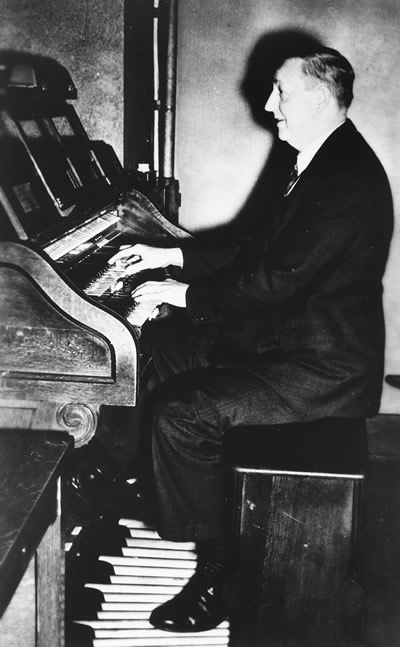The Harding Collection
Twenty Minutes - Ragtime to Riches
Broadcast on BBC Radio 3, 8:10PM Tue, 7 Feb 2012
Abigail Williams reveals the extraordinary story of Walter Harding - bricklayer's son turned ragtime pianist - who became a major benefactor of the Bodleian Library in Oxford.
Most of the miscellanies in the bibliography are contained within the Bodleian Library's Harding collection, which houses the most significant but largely neglected group of miscellanies in the world.
The information from the Harding collection miscellanies will be combined with data from the copies of all the miscellanies in the bibliography in other libraries, such as the British Library, and Cambridge University Library. The contents of the database are based on a comprehensive bibliography of eighteenth-century poetic miscellanies compiled by Professor Michael F. Suarez SJ
Walter Harding: the collector of collections
Walter Newton Henry Harding was born in south London in 1883, the son of a bricklayer. At the age of four, he and his immediate family emigrated to America, where they were to remain for the rest of their lives. Their family home, a suburban timber-framed house in Chicago, was to become the library and repository of Harding's remarkable collection of printed music, verse, and drama. At the time of his death, in December 1973, each room was lined with ordered and catalogued books, the basement effectively an underground stack.

Walter Harding was not an academic or book dealer. He worked as a ragtime pianist, making much of his living from performing at Masonic events. He seems to have become involved in collecting through his interest in the words to songs he knew or performed. Music led him to verse, then drama, to sheet valentines and on to opera. His success as a book collector was partly due to the unfashionability of the material he was collecting: ephemeral, popular publications with little commercial value in the mid twentieth century. Harding immersed himself in his books and the musical past that they represented for him. A Canadian visitor, Clarence Tracey, paints a vivid picture of an afternoon spent with Harding:
'I imagined that he was a millionaire bibliophile with a mansion in one of the fashionable northern suburbs and that he would be well protected by watch-dog secretaries, and so I was surprised when he answered the telephone himself and at once invited me to come to his house right away. I was even more surprised when the bus took me into a dreary slum and beyond it into what could only be described as a working-class district. Not a place in which one would expect to find a library of rare books! But here in a small storey-and-a- half frame house with two lilac bushes blooming in the dooryard Mr Harding lived alone. He led me into a small gloomy living room furnished with a chesterfield set that must have been thirty years old and was upholstered in a reddish mohair that showed no evidence of having been ever sat on before. We sat on his red mohair for a few minutes making polite and awkward conversation. So I was relieved when he said, "Would you like to see my books?" and agreed whole-heartedly.
These had taken over most of the upper storey, ousting beds and other domestic appurtenances. Instead, each of the rooms that I could see was lined with what looked like home-made book shelves and was furnished with deal tables and hard chairs. The tables were provided with pickle bottles of pencils and a volume or two of such reference books as the British Museum Catalogue of Music[…]
Surrounded by his books, Mr Harding came to life. At once he produced the book I had come to see and allowed me to examine it and transcribe several poems. Afterwards he showed me a few of his other treasures, and it became clear that he knew his collection intimately, being able not only to pick the right book off the shelf but to turn to the right page in it in an instant to find a version that he wished to show me of some eighteenth-century song, such as 'Cherry Ripe' or 'Sally in our Alley'. [...] I am sure that he lived in his library, every day getting to know each book better and better. They were his wife and children, and that was why he would not consider selling them.'
As this account suggests, Harding was devoted to his book collection. But by 1950 he was a single childless man in his late 60s, with no close relations, and he decided to give his library to the Bodleian, two decades before he died. He had never been to Oxford, and had not returned to England since his early childhood. His gift seems to have been motivated in part by a sense of nostalgia for a past England, a world that he had known only through the books he had collected, and partly by a sense, post-war, of the destruction of European culture. He wrote in 1949: ' I am a transplanted Englishman and so I wonder if my books should not go back to the land from whence they came and to the people that wrote the songs they contain.' The collection, one of the largest within the library, arrived in 1975, by air, weighing 22 tonnes.
The majority of the miscellanies contained within the Digital Miscellanies Index come from Harding's collection of songbooks within the Bodleian. Harding had composed his own, handwritten record of their contents, a first line card-index occupying over 60,000 cards, on which he had recorded titles, first lines, and tunes of all the songs within his collection. He published an article on his books, entitled 'British Song Books and Kindred Subjects,' Book Collector 11 (Winter 1962), 448-59. At the end of the piece, he talks of his love of the popular songs he has found, which 'typify my fifty-odd years of collecting, with the happiness and joy in living which they have brought me.'
Bibliography
Anon, 'Organist dies at 90 leaving Fortune in Rare Sheet Music' New York Times, 14 December 1973, p.34
Geil, Jean, 'American Sheet Music in the Walter N.H. Harding Collection at the Bodleian Library, Oxford University', Notes, 34.4 (1978), 805-14
Harding, Walter N.H., 'British Song Books and Kindred Subjects,' Book Collector 11 (1962), 448-59
Hyatt King, A, Some British Collectors of Music, c. 1600-1960 (Cambridge: Cambridge University Press, 1963), 82-83
Hunter, D, 'The publication and dating of an early 18th century English songbook', Bodleian Library Record, 11 (1984) 231-40.
Solheim, Helene Elizabeth, 'Walter N.H. Harding and the Harding Drama Collection at the Bodleian Library, Oxford', unpublished Phd diss, University of Washington, 1985.
Turner, Michael L., 'Who Was Walter Harding? Some Preliminary Notes on his English Antecedents, Part One', Bodleian Library Record, 15 (1996), 422-454.




